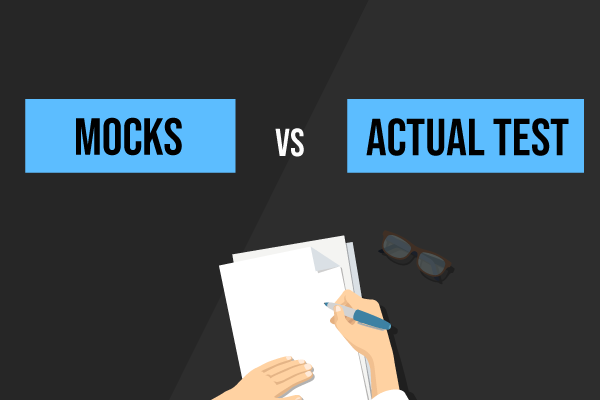Preparing for exams can be daunting, but it doesn't have to be. Many students find solace in mock tests as they navigate through their study journey. These simulated exams serve as a bridge between the classroom and the actual test day, offering invaluable insights and opportunities for improvement. In this article, we'll explore the significance of mock tests versus actual exams and how they can help test-takers excel.
Understanding Mock Tests:
Mock test, also known as practice exams or trial exams, mimic the format and structure of the actual exams. They cover the same content and are often designed to replicate the timing and conditions of the real test environment. Mock tests can be found in various forms, including online platforms, textbooks, and study guides. Their primary purpose is to assess a student's understanding of the material and identify areas of weakness.
Advantages of Mock Tests:
- Familiarization with Exam Format: Mock tests provide test-takers with a preview of the exam format, including the types of questions, time constraints, and instructions. This familiarity helps reduce anxiety and boosts confidence on test day.
- Identification of Weaknesses: By taking mock tests, students can pinpoint areas where they need improvement. Whether it's mastering a specific topic or refining test-taking strategies, mock exams highlight areas of weakness that require further attention.
- Practice Under Pressure: Mock tests simulate the pressure of the actual exam, allowing students to practice managing their time effectively and maintaining composure under stress. This experience helps alleviate test-day jitters and promotes better performance.
- Feedback and Assessment: Many mock tests come with detailed feedback and performance analytics, enabling students to track their progress over time. By analyzing their strengths and weaknesses, students can tailor their study plans to focus on areas that need the most improvement.
- Confidence Boost: Successfully completing mock tests instills a sense of accomplishment and confidence in students. It validates their preparation efforts and reinforces their belief in their ability to perform well on the actual exam.
Differences Between Mock Tests and Actual Exams:
While mock tests serve as valuable preparation tools, it's important to recognize the differences between mock exams and the real thing.
- Stress Levels: The pressure and stress experienced during mock tests may not fully replicate the intensity of the actual exam environment. Test-takers should be prepared for heightened nerves and adrenaline on test day.
- Stakes: Mock tests carry minimal consequences, whereas actual exams determine academic or professional outcomes. The sense of urgency and importance attached to the real exam can significantly impact performance.
- Adaptability: Actual exams may present unexpected challenges or variations in question format that mock tests cannot fully replicate. Test-takers must be adaptable and flexible in their approach to tackling unfamiliar scenarios.
- Timing: While mock tests aim to replicate the time constraints of the actual exam, unforeseen circumstances or technical issues may arise during the real test, affecting timing and pacing strategies.
Strategies for Bridging the Gap:
To maximize the effectiveness of mock tests in preparing for actual exams, test-takers can implement the following strategies:
- Treat Mock Tests Seriously: Approach mock tests with the same level of seriousness and commitment as the actual exam. Create a conducive environment free from distractions and adhere to the designated time limits.
- Analyze Performance: Review the results of mock tests critically and identify patterns or recurring mistakes. Pay attention to areas of weakness and prioritize them in your study plan.
- Mimic Real Exam Conditions: Practice under conditions that closely resemble the actual exam environment, including timing, noise level, and seating arrangement. This helps condition your mind and body for the pressures of test day.
- Seek Feedback and Guidance: Utilize feedback from instructors, tutors, or peers to refine your study strategies and address areas of improvement. Don't hesitate to seek clarification on challenging concepts or seek additional resources for support.
- Embrace Mistakes: View mistakes as learning opportunities rather than failures. Use them to identify areas for growth and refinement in your knowledge and skills.
- Develop Effective Study Habits: Establish a consistent study routine and employ proven techniques such as active recall, spaced repetition, and mnemonic devices to enhance retention and comprehension.
Conclusion:
Mock tests play a crucial role in bridging the gap between preparation and performance for test-takers. By simulating the conditions of the actual exam and providing valuable feedback, mock tests empower students to refine their skills, boost their confidence, and ultimately achieve success on test day. By embracing the challenges and opportunities presented by mock tests, students can embark on their exam journey with clarity, competence, and determination.





Comments